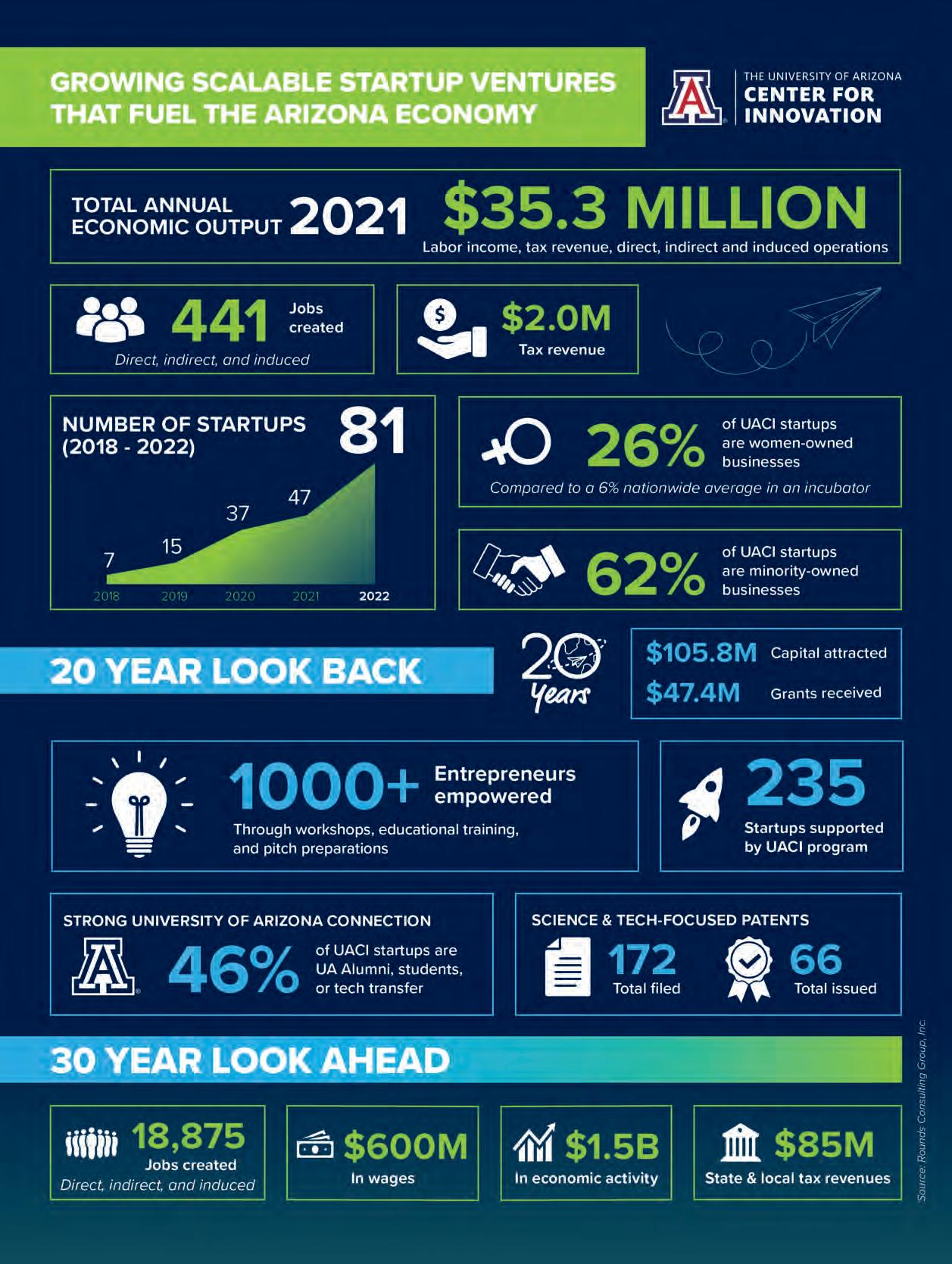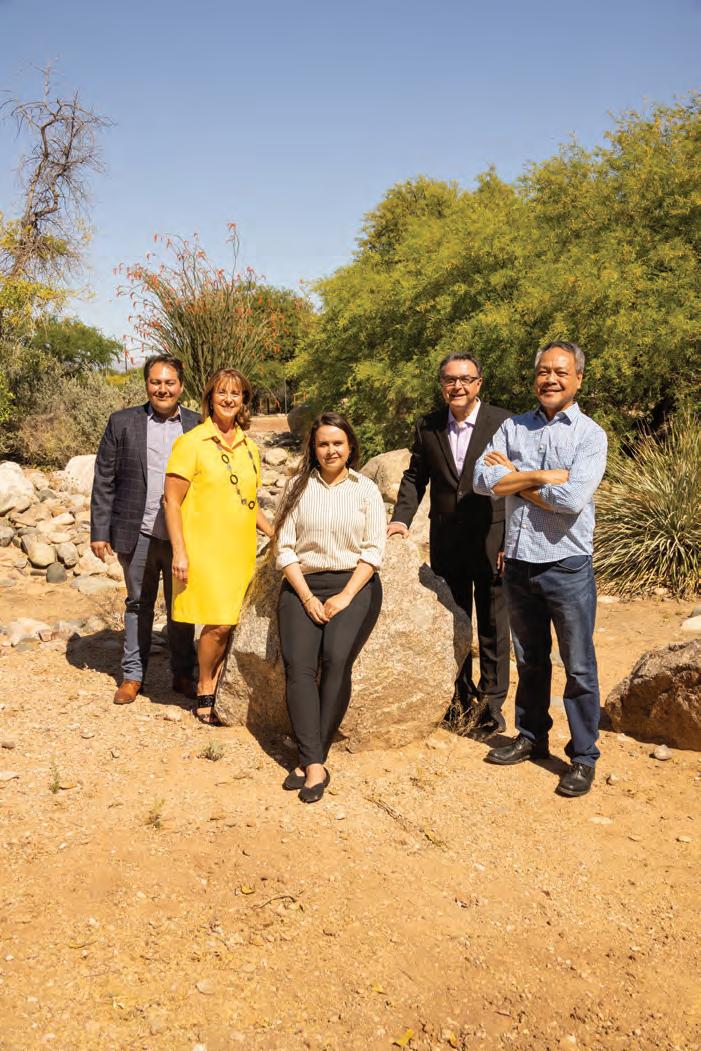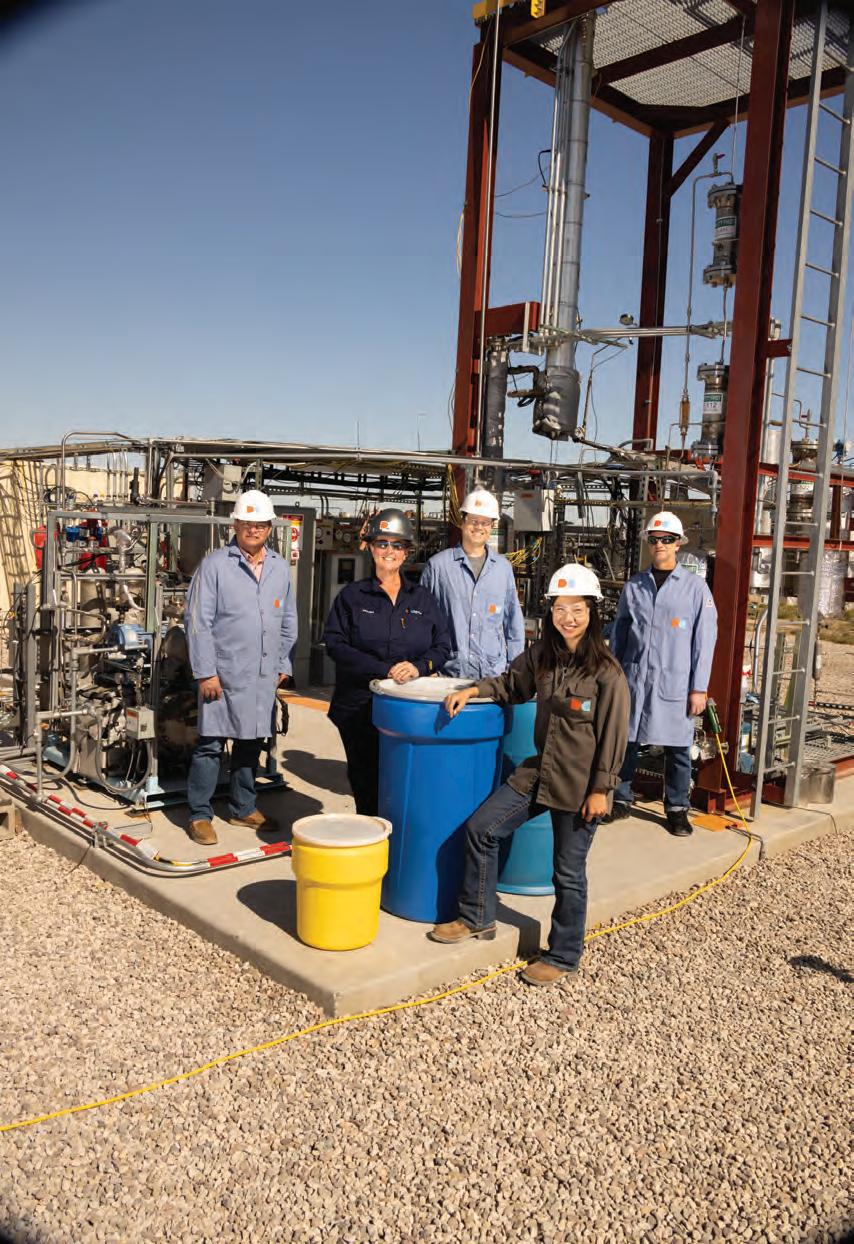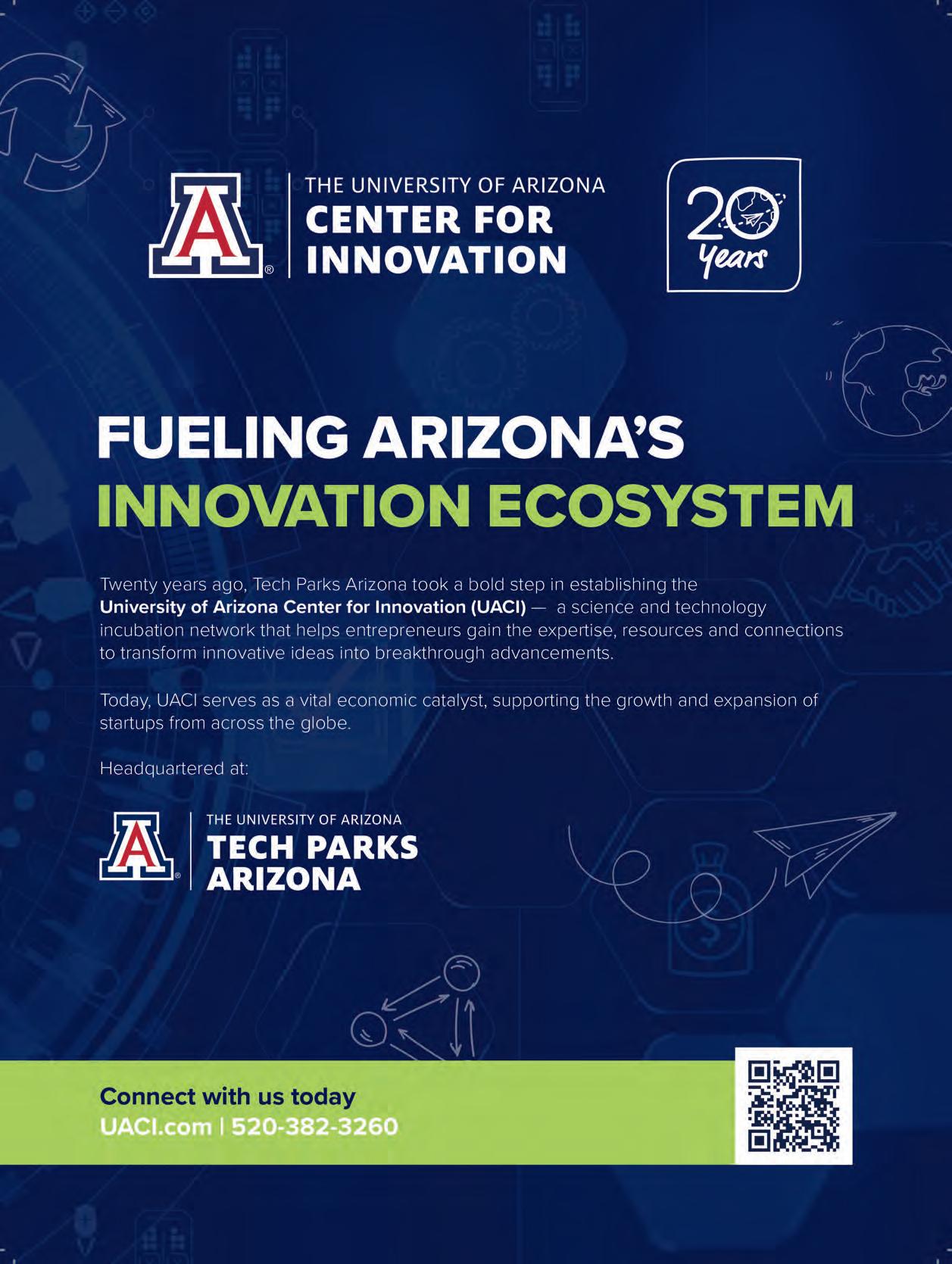UNIVERSITY OF ARIZONA CENTER FOR INNOVATION
TWO DECADES OF FUELING THE STARTUP ECOSYSTEM IN ARIZONA






TWO DECADES OF FUELING THE STARTUP ECOSYSTEM IN ARIZONA






 Eric Smith Executive Director University of Arizona Center for Innovation
Carol Stewart Vice President Tech Parks Arizona University of Arizona
Elizabeth “Betsy” Cantwell Senior Vice President Research & Innovation University of Arizona
Eric Smith Executive Director University of Arizona Center for Innovation
Carol Stewart Vice President Tech Parks Arizona University of Arizona
Elizabeth “Betsy” Cantwell Senior Vice President Research & Innovation University of Arizona
emanating from UArizona has ignited a bustling startup scene. “It’s an example of how we extend beyond our campus to engage our community, empowering entrepreneurs to grow businesses that create jobs, and improve lives with their innovations,” he expressed.
He’s no stranger to creating such a culture. Robbins joined UArizona in 2017 after serving as the president and CEO of Texas Medical Center for five years. While there, he introduced five cross-institutional research initiatives. Prior to that, he was a professor and chairman of the Department of Cardiothoracic Surgery at the Stanford University School of Medicine.

Like Robbins, Cantwell boasts an impressive career of fostering growth and creativity. Before joining UArizona in 2019, she was VP of research development at Arizona State University. Her resume has included leadership roles at the nation’s most prominent labs and institutions, including the Los Alamos National Laboratory, Oak Ridge National Laboratory and NASA headquarters. In her four years at UArizona, Cantwell has managed the Office of Research, Innovation and Impact which is responsible for bringing discoveries to market via technology licensing and new company creation. She was recently selected as the 17th president of Utah State University and begins her new role in August.
Cantwell said UACI also wants to attract businesses from outside the region and aid entrepreneurs from diverse backgrounds. To date, UACI has assisted 25 international companies from 17
countries. “We now have a comprehensive international program and support businesses seeking U.S. market entry through an accredited Soft Landings program,” she said.
UACI carries the official Soft Landings designation from the International Business Innovation Association, certifying its abilities to provide best practices when accommodating the necessary resources and programming international companies require for a smooth entry into the country.
“Running a fast-growing tech company is extremely challenging, so UACI allows us to decrease the barriers and burden of global market expansion,” Cantwell said.


Robbins added, “We are just beginning to see the results of UACI’s sophisticated approach to international startup support.”
There has been great interest for UACI to duplicate its success at outpost locations. To that end, communities including Nogales, Yuma, Prescott, Douglas, Maricopa and Sierra Vista have banded together to create a rural incubator network with UACI at its core.
As VP of Tech Parks Arizona, Carol Stewart is on the front lines serving as the president of UACI and directing its mission to grow scalable science and technology startup ventures that fuel Arizona’s economy. She has more than 20 years’ experience of university-based economic de-
velopment, leading research parks and advancing technology by bringing tech ideas to the marketplace. Under her leadership, UACI has thrived and continues to grow.
“Homegrown economic development is a powerful strategy for any municipality to invest in,” Stewart expressed. “All these efforts build a strong UArizona innovation brand and I propose that UACI will be recognized as a top 10 incubator globally in less than a decade if we continue at this rate of impact.”




“UACI has helped us achieve so much through mentorship, resources, and networking opportunities. By establishing a supportive community of fellow entrepreneurs, we learn from one another and are inspired by the work others accomplish because of this collaborative environment.”
 − Araceli Hernández-Granados Senior Engineer
− Araceli Hernández-Granados Senior Engineer
CarbeniumTec enables the green-energy future by developing a new all-organic battery for long-duration energy storage that will provide utility companies a solution to the urgent and growing need for electricity storage without the environmental impacts from mining and refining lithium or other metals.









totyping center, meeting spaces as well as administrative support.
In 2021, UACI’s work with startups resulted in $35.3 million in economic impact to Southern Arizona plus $2 million in tax revenue. Of additional importance, 26% of the incubator’s startups are women-owned, compared to just 6% nationwide; 60% of its startups are minority owned; and 46% have a connection to UArizona either through technology licensed by the university or founders that are alumni or graduate students. Over the last 20 years, UACI startups have managed to fundraise over $105 million dollars in equity investment, federal grants and other awards.


“Over the course of the next 30 years, UACI will create an estimated 18,875 jobs, generate over $600 million in wages, produce $1.5 billion in economic activity, and create nearly $85 million in state and local tax revenues,” noted Eric Smith, UACI’s executive di-
ACI has done an incredible job helping startups from the university and tech community realize their commercial market potential,” said Elizabeth tsy” Cantwell, UArizona’s senior vice president of research and innovation. “It’s how we ensure that our work eaches far beyond the university and
continued on page 76 >>>
>






Paramium Technologies is developing a better solution to connect Earth and space using advanced manufacturing methods to meet the radio communications industry’s need for fast, flexible and accurate fabrication of freeform curved metal reflectors for ground stations and satellites. The startup leveraged multiple technologies developed at the University of Arizona Steward

The patented Nymbus Smart Concert platform enables musicians and live-music brand spon sors to transform one-time audience interactions into long-term relationships. In combination with data-tracking software, Nymbus Media wrist band SMART Bracelets create interactive audi ence experiences with venue-wide lightshows and clap-to-post technology instantly upload ing concert exclusive content to attendees’ social feeds, boosting critical social engagement metrics.
Nymbus Media is completing product development at UACI and is proudly mass-producing LED bracelets in the USA. The startup showcased their tech at the TENWEST Impact Festival con cert after party, bringing data and science to life with innovative light up wristbands.








LabPair is a web application that creates a two-sided marketplace where researchers who have unused resources are paired with the researchers in need. Through publication-driven matchmaking, researchers can obtain valuable information saving time and money. LabPair utilizes two major problems in research – the pressure to “publish or perish” and the vast amounts of unpublished data and unused samples – to create an efficient solution to the issue.
“UACI is helping LabPair move from concept to launch. As we face challenges when scaling the business, the excitement for our product as well as the ongoing enthusiastic support from the UACI team keeps us going.”



Desert Pearl Mushrooms is a medicinal and gourmet Sonoran Desert mushroom farm dedicated to de veloping low-water sustainable agriculture for the benefit of the arid American Southwest. In addi tion to a variety of fresh specialty mushrooms, the product line includes dried, ground or powdered mushrooms, extract tinctures and an assortment of growing supplies and materials.
“UACI has been an excellent source of knowl edge, coaching and mentorship. Starting a business has had its years of going through the program, we’ve quadrupled the number of fresh mushrooms we sell to the greater Tucson area, both retail and wholesale. And we have plans to launch an online subscription service.”

 − Kristopher Savage Co-owner & Chief Technology Officer
− Kristopher Savage Co-owner & Chief Technology Officer
Together, we can achieve more.
It’s a simple phrase at the heart of the University of Arizona Center for Innovation. The number of partners that UACI works with is too great to list, but every contributor adds to the success of a startup. UACI is part of the Tucson Innovation Partnership, a group of leaders that serve the entrepreneurship and innovation communities, work collaboratively and represent the very best in small business support.
UACI has worked with a number of organizations over the past two decades as the ecosystem has evolved streamlining how organizations come together to raise startups as a community.
Established in 2002 and grown to a membership of 750 professionals, the Arizona Technology Council is the state’s principal advocate for science and technology-based companies. AZTC hosts events, educational forums and business conferences that bring together visionaries, leaders and innovators to further advance the technology industry in Arizona. It’s marked several key achievements over the past 20 years, including the restoration of career and technical education funding, pro-technology legislation and the founding of the SciTech Institute, which strengthens Arizona’s science and technology ecosystem.
UACI’s connection with Arizona Technology Council provides entrepreneurs with a vast network covering




the entire tech industry spectrum plus business support organizations needed for growth. In a rapidly evolving tech world, the synergistic relationship between AZTC and UACI enhances opportunities for startups by complementing each other’s strengths and sharing insight into tech market trends.
“We are unlocking the full potential of the tech ecosystem through a culture of knowledge sharing, where expertise flows freely from established giants to aspiring startups,” said Karla Bernal Morales, VP of Arizona Technology Council’s Southern Arizona Regional Office. “In this interconnected landscape, the collective wisdom propels innovation, drives progress, and equips the next generation of disruptors. Fueling tech growth is at the heart of what both organizations do. By combining the leading incubator network with the premier tech association, the collaboration empowers entrepreneurs to thrive and has accelerated the growth of Arizona’s tech sector.”
Desert Angels, which launched in 2000, is a nonprofit organization of accredited angel investors who invest money in early-stage, scalable companies across multiple industries nationwide. Desert Angels is currently ranked No. 1 in the Southwest region and No. 4 in the U.S. based on number of deals, according to the Angel Resource Institute HALO Report. Desert Angels
continued on page 84 >>>
“ the leading incubator network with the premier tech association, the collaboration empowers entrepreneurs to thrive and has accelerated the growth of Arizona’s tech sector.”
– Karla Bernal Morales VP, Arizona Technology Council Southern Arizona Regional Office
US Air Tech Corp. is a research and development company developing a novel type of antenna named STELLA − Satcom Technology of Elaborate Luneburg Lens Antenna. This innovative technol ogy for low-Earth orbit satellite communications provides cost-effective and reliable global inter net connectivity, data and communications.
“We are excited to be a champion for global connection, removing barriers and bringing communities together. We share this pride with UACI which supports our vision.”
− Dr. Patrick Gbele, Founder & CEO

MindReady provides sport psychology coaching and education for athletes and parents because every athlete deserves an environment that nurtures, enhances, and develops their mental performance.
Through the UACI program, MindReady expanded its network with new markets, potential clients. UACI coached the star tup for the IdeaFunding competition where it was selected as one of five main stage finalists. MindReady won two sep


continued from page 82
members have invested more than $60 million in 110 new companies since 2010.
UACI and the Desert Angels have commonly worked together orchestrating events like IdeaFunding, Arizona’s largest and longest running competition that provides startups with the opportunity to pitch their businesses on a major stage and win thousands of dollars in cash prizes.
Desert Angels’ long-lasting relationship with UACI is noteworthy. “Des-

Doug Hockstad, associate VP of Tech Launch Arizona, describes TLA and UACI as two sides of the same coin. “TLA gets new technologies and inventions rooted in University research off the ground,” Hockstad emphasized, “We have a dedicated venture development team that supports the early stages of startup development, from idea through formation and launch. That said, after launch, most of these young university-based tech companies still need more support to grow and scale. UACI helps those startups incubate and
port units at the University of Arizona into the marketplace. “UArizona is a top-tier research institution,” Hockstad proclaimed. “TLA commercializes the results of that research.”

TLA serves as one of multiple sources of startups that feed into UACI. The bridge between organizations is fortified by the fact that UACI Executive Director Eric Smith worked at TLA prior to this role.
“It’s seamless,” Hockstad said. “Eric understands the technology development, licensing and venture development side from his work at TLA. Now

“Roughly 10% of our portfolio of invested companies are UACI graduates, but over 80% of that portfolio are based in Arizona and likely have had some support, mentoring, or program access provided by UACI.”
– Joann MacMaster CEO Desert Angels



 By Romi Carrell Wittman
By Romi Carrell Wittman
Launching a startup business is no different than embarking on a road trip. Without a map – and resources to help you along the way – you won’t get very far.
Crafting a clear plan – a roadmap – for startups to find their footing was the impetus behind the creation of University of Arizona Center for Innovation’s 27-point roadmap of customized business support. The map assists entrepreneurs with everything from problem identification to writing a business plan to acquiring funding and pitch preparation.
UACI developed the comprehensive roadmap through an exhaustive process of benchmarking all the best incubators in the world. The result is a program that improves how UACI serves its clients, by outlining a continuum of activities and major buckets of work needed for success.
The brilliance of UACI’s 27-point roadmap lies in its simplicity and its ability to track progress. As an alternative to running cohorts, when companies join the incubator network, they take a baseline assessment, which offers keen insight into where they are along the startup journey.
Thus, UACI can adjust to the unique needs of its startups. “Currently, we have 75 companies and they’re all over the map, literally. The roadmap provides the tactical direction for us to meet them exactly where they’re at,” said UACI executive director Eric Smith.
Entrepreneurs typically work through the UACI program over the course of two years.
In addition to its signature roadmap, UACI offers several programs to meet the needs of different types of startups, including educational webinar series such as Noontime Knowledge and Sponsored Launch programs which provide scholarships for companies through a competitive process with a sponsor organization, internship programs where paid university students can work side-by-side with UACI entrepreneurs, and the Global Advantage and Soft Landings programs for international companies seeking U.S. market expansion.
Biz









Auxilium repurposes mine tailings to fuel the energy transition and achieve net-zero waste. The zero waste to zero emissions strategy minimizes the footprint of the mining industry producing carbon negative metals and carbon sequestering building materials. Auxilium’s modular approach allows for rapid deployment across mine sites and is positioned to be the global benchmark for

University of Arizona Center for Innovation’s successful Soft Landings and Global Advantage programs are designed specifically for expanding international firms to gain footing in the U.S.

“Southern Arizona is an ideal place for U.S. market entry because of its strategic location and relatively low business startup costs and high accessibility to major market connections including California, Texas, and Mexico,” said Carol Stewart, VP of Tech Parks Arizona.
UACI earned the Soft Landings accreditation in 2020 from the International Business Innovation Association. In order to receive the designation, UACI demonstrated its ability to meet the high-level, multi-faceted accommodations needed by international companies looking to establish U.S. operations.
The program has had tremendous success, helping 25 international startups hailing from 17 different countries such as Australia, Canada, Colombia, Costa Rica, Great Britain, Kosovo, Mexico, Spain and Ukraine to explore

U.S. expansion opportunities by connecting with UACI.
International startups can participate in person or virtually and access the same UACI programming, staff, mentors and subject matter experts. This approach ensures that needs are efficiently met as the business explores and scales international operations.


The U.S. Department of State, via its Global Innovation through Science and Technology Initiative, selected UACI to host cohorts of international business executives from emerging economies for six months, providing them with programming and networking opportunities. UACI was just one of 10 sites selected across the United States to serve as an appointed host due to its history of success supporting science and techbased startups, its proximity to Mexico, and strong connection to the University of Arizona.
UACI works with international governments to foster startups around the world for a one-month immersive educational experience that provides travel, lodging and programming paid for by the home country.
UACI and local Global Advantage partners fund inbound exploratory missions and assist startups by fostering opportunities specific to the individual company’s needs. UACI’s business incubation program focuses on scaling operations and identifying market potential by utilizing the international expertise of Global Advantage partners. Global Advantage partners include: CAID Industries, Farhang & Medcoff, Cushman & Wakefield | PICOR, Tech Parks Arizona, Tetakawi and Tucson Electric Power.
Since 2019, nine companies have moved to Tucson from outside Arizona, four of which are from other countries. The most recent company, Red Sea Farms from Saudi Arabia, was quite successful and within one month of landing at UACI fundraised $18 million which had significant direct economic benefits to Southern Arizona.
UArizona President Dr. Robert C. Robbins said, “We are just beginning to see the results of UACI’s sophisticated approach to international startup support.”
SorbiForce develops and produces innovative, sustainable, and non-metal batteries for gy storage applications. The batteries are made from renewable raw materials and offer a cost-effective, environmentally friendly alternative to traditional energy storage solutions.








continued on page 96 >>>




REPARVI is a synthetic biology company working to address challenges to preserving, editing and repairing cells. The startup epair EngineeringTM technologies that address the damage commonly accompanying engineered cell therapies, and can be utilized from cell storage and preservation through gene delivery. The early-stage company has technology applications throughout the cell


Dimensional Energy gives carbon dioxide new life as a cost-effective building block for industrial fu els and consumer products traditionally made from fossil carbon. Until now, carbon dioxide has been defined as waste − it is what’s left over when all the energy is burned off energy-dense fuels, warming our planet and categorized as a byproduct impossible to utilize cost effectively. With Dimensional Energy’s carbon utilization plat form, carbon-intensive industries can chart a course to carbon neutral or zero emissions operations.
The Dimensional Energy Tucson Tech nology Center, located in the Solar Zone at the UA Tech Park, produces fossil-free wax derived from emissions that can close the loop on humanity’s industrial carbon cycle.


 PHOTOS BY BRENT
PHOTOS BY BRENT
continued from page 94
continued on page 98










continued from page 96
program. Entrepreneurs use various physical spaces at Biosphere 2 to test and demonstrate their tech in one of many specific environments supplying a unique advantage for innovators in this field.
Behind the glass, visitors can see UACI startups at the Biosphere 2 outpost working on businesses that address sustainable agriculture, high-efficiency solar power, and simulations of closed ecosystems to prepare for human habitation on the moon or Mars. By purposefully interconnecting resources to foster innovation, business can rapidly test, demonstrate and deploy new technology. Potential expansion plans include the creation of a tech park that will enable private businesses to directly participate in the ongoing research and innovation endeavors at Biosphere 2.
During the grand opening of the UACI outpost, UArizona President Dr. Robert C. Robbins said, “The research expertise at the University of Arizona contributes to the worldwide effort to develop a more sustainable future. This future-focused environment, dedicated
to moving innovations forward, provides the ideal platform for technology advancements and business growth.”

Opened in 2019, the UACI at Oro Valley site is an incubator focused on supporting bioscience discoveries and helping entrepreneurs translate them into marketable technologies.
Located northwest of Tucson, the Town of Oro Valley is a bioscience epicenter growing from UArizona tech startup Ventana Medical Systems that was acquired by pharmaceutical giant Roche. UACI links UArizona’s innovation ecosystem directly into the heartbeat of Oro Valley’s thriving bioscience sector.

UACI’s incubator is located in Innovation Park and is poised to help launch and grow new bio and life scienceoriented enterprises with programming and specialized facilities including office, lab space, and shared equipment such as an ultra-low, minus-80-degrees freezer, biosafety cabinets and an inverted fluorescence microscope.
In addition, the Oro Valley Chamber of Commerce and the Bioindustry Or-

ganization of Southern Arizona (BIOSA) sponsor startups specifically for this outpost through the UACI Sponsored Launch program.
In partnership with UACI, the Town of Sahuarita has established an incubator program for startups based in the Sahuarita and Green Valley communities. The incubator hosts educational opportunities for entrepreneurial expansion, like one-day boot camps, and provides the tools needed to get businesses off the ground. In addition, the Town of Sahuarita, in collaboration with Freeport-McMoRan Inc, sponsor startups annually through the Sponsored Launch program.
Born out of collaboration, in the Vail Chamber Connection office is a UACI touchdown office space. Conversely, the Vail Chamber has a touchdown office located in UACI’s headquarters. Startup companies, business coaches, Vail businesses, Tech Parks partners and more work from either office, building their businesses and networks.


